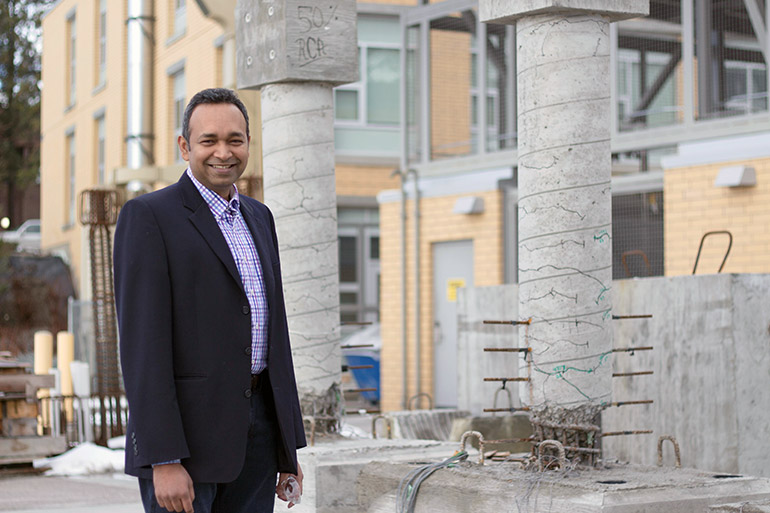
Shahria Alam, co-director of UBC’s Green Construction Research and Training Centre and the lead investigator of the study.
Recycled concrete can even outperform traditional construction, says researcher
Results of a new five-year study of recycled concrete show that it performs as well, and in several cases even better, than conventional concrete.
Researchers at UBC Okanagan’s School of Engineering conducted side-by-side comparisons of recycled and conventional concrete within two common applications—a building foundation and a municipal sidewalk. They found that the recycled concrete had comparable strength and durability after five years of being in service.
“We live in a world where we are constantly in search of sustainable solutions that remove waste from our landfills,” says Shahria Alam, co-director of UBC’s Green Construction Research and Training Centre and the lead investigator of the study. “A number of countries around the world have already standardized the use of recycled concrete in structural applications, and we hope our findings will help Canada follow suit.”
Waste materials from construction and demolition contribute up to 40 per cent of the world’s waste, according to Alam, and in Canada, that waste amounts to nine million tonnes per year.
The researchers tested the compressive strength and durability of recycled concrete compared with conventional concrete.
Concrete is typically composed of fine or coarse aggregate that is bonded together with an adhesive paste. The recycled concrete replaces the natural aggregate for producing new concrete.
“The composition of the recycled concrete gives that product additional flexibility and adaptability,” says Alam. “Typically, recycled concrete can be used in retaining walls, roads and sidewalks, but we are seeing a shift towards its increased use in structures.”
Within the findings, the researchers discovered that the long-term performance of recycled concrete adequately compared to its conventional form, and experienced no issues over the five years of the study. In fact, the recycled concrete had a higher rate of compressive strength after 28 days of curing while maintaining a greater or equal strength during the period of the research.
The researchers suggest the recycled concrete can be a 100 per cent substitute for non-structural applications.
“As innovations continue in the composition of recycled concrete, we can envision a time in the future where recycle concrete can be a substitute within more structural applications as well.”
The research was funded by the Natural Sciences and Engineering Research Council of Canada (NSERC), as well as OK Builders Supplies Ltd. and KonKast Products Ltd. through a Collaborative Research & Development grant. It was published in the Journal Construction and Building Materials.